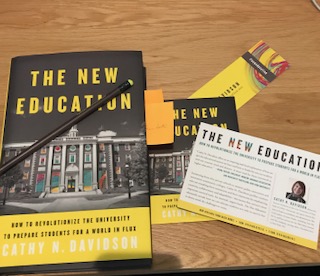Category: Pedagogy
-
What’s the Best Way To Study for Finals?

As finals approach, many students wonder what is the best way to study for exams. This is a question that has been researched often, in many situations, and the most consistent, best answer: form a study group. The best research on college success—whether at a top ten university or in a remedial class at a […]
-
Goal-Based Teaching
A strategy I used to get my students in my 8 a.m. class more engaged was to check in with them by asking what their goals were for this class. Since then I’ve been catering every class to meet their goals as best I can. Today I asked them to revisit those goals (handing back their […]
-
What Is a HASTAC Scholar? Please Join Me in Welcoming Our Next Cohort!

Welcome new HASTAC Scholars! It is a great pleasure to welcome you to the Humanities, Arts, Science, and Technology Alliance and Collaboratory—-“Haystack,” we say. HASTAC is an alliance, a network, a community, and not a formal organization in a traditional sense. HASTAC is shaped by the contributions of its network members. As HASTAC Scholars, you […]
-
Researching Together in Your Lecture
This week I taught Their Eyes Were Watching God by Zora Neale Hurston in my Advanced Topics in 19th Century Literature course, subtitled: “Gender in the American Renaissance.” I’ve struggled with this 8 a.m. class, trying to avoid lecturing because I try very hard to make every class student-centered. I hand over half the syllabus […]
-
Misinformation in Online News: Post-Workshop Reflections

The issue of misinformation in online news has been particularly visible of late, as public discourse responds to developments in American politics such Donald Trump’s dismissal of dissenting journalism as “fake news” and the Russian manipulation of Facebook content targeting American voters during the last election. Emilie Jabouin and I have taken up this issue […]
-
Making Time for Listening Dyads in the Classroom

One of the challenges of teaching is struggling to find time–the time you need to lesson plan and prepare for your classes, to cover material you’ve included on your course syllabi, to support students, create and grade assignments, and so on and on. Teachers are pressed for time. This is hardly a new revelation. And yet, because […]
-
“How to Revolutionize the University” – Cathy N. Davidson on #NewEducation at Duke University – Video

Our friend and colleague, Eric Barstow, of Franklin Humanities Institute, has been kind enough to share this captivating video, which he produced on behalf of FHI and Duke. In it we are treated to a recent conversation between HASTAC’s very own Cathy N. Davidson and Ed Balleisen, Vice Provost for Interdisciplinary Studies at Duke University, entitled “How to Revolutionize the University.”‘ From Eric’s email sharing this great […]
-
Consent-Based Pedagogy and “Low-Stakes” Assignments

This piece is cross-posted on the Designing for All (DfA) project page (and the CUNY Humanities Alliance site): DfA is a project I’m co-coordinating with the Center for Teaching and Learning at LaGuardia Community College. We are working with students, staff, and faculty from across disciplines to create a more accessible educational experience at LaGuardia, countering unequal power […]
-
How To Make #NewEducation Work in Your Classroom Today

At dinner the other night, a dear friend who has read The New Education: How to Revolutionize the University to Prepare Students for a World in Flux, said, “I loved the book–but it really didn’t tell me how to teach Martin Heidegger tomorrow.” He’s right. And that’s intentional. I want profs to assess their own […]
-
ProfHacker Post “Using Digital Archives to Teach Data Set Creation and Visualization Design”